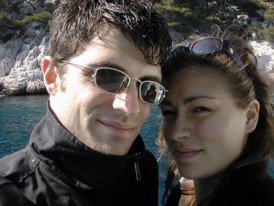American Lifestyle Part 1
Where's the Diversity?
by Pohsi Teng
 With the rapid flow of information, goods and services available almost anywhere, one would think that human civilization is now closer than ever. Unfortunately, it is far from so; while the rest of the world is in sync with all things American, many American youths are not aware of, let alone interested in, others who inhabit the world. In a nutshell, quite a majority just don't care. It is extremely pertinent and timely, that American students understand the diversity and complexity of other cultures, by yearning to see and learn more. They need to re-evaluate common pre-conceptions and stereotypes about others, instead of merely seeing what's outside the country through the lenses of American television channels. With the rise of anti-American sentiment due to the current political climate and war in Iraq, it is especially important that they become more informed global citizens.
With the rapid flow of information, goods and services available almost anywhere, one would think that human civilization is now closer than ever. Unfortunately, it is far from so; while the rest of the world is in sync with all things American, many American youths are not aware of, let alone interested in, others who inhabit the world. In a nutshell, quite a majority just don't care. It is extremely pertinent and timely, that American students understand the diversity and complexity of other cultures, by yearning to see and learn more. They need to re-evaluate common pre-conceptions and stereotypes about others, instead of merely seeing what's outside the country through the lenses of American television channels. With the rise of anti-American sentiment due to the current political climate and war in Iraq, it is especially important that they become more informed global citizens.
"The problem is a lot of students already think that they're thinking outside of the box," said San Francisco State University study abroad advisor Kati Anderson Bell. "They need to ask themselves, 'Am I really?' How do you know unless you leave?"
Practices and habits that are not the norm in America are frequently dismissed as quirky, odd or appalling. While the rest of the world feeds on America's MTV, Hollywood blockbusters and CNN news programs, the youngsters in this country are often blissfully ignorant and uninformed about anything beyond their country. It comes as no surprise that unexposed teens often face culture shock and cognitive dissonance - stark realities that oppose one's personal beliefs - when encountering non-American customs and lifestyles.
 Noah Kuchins, 27, a history major at SF State who studied in Aix-en-Provence and Paris, takes pride in how he has been a good American "ambassador," by breaking stereotypes. According to Kuchins, when the French think about Americans, they immediately associate everyone with Hollywood movies. It comes as no surprise that such a generalization would abound, as many of them have not personally known anyone from this country.
Noah Kuchins, 27, a history major at SF State who studied in Aix-en-Provence and Paris, takes pride in how he has been a good American "ambassador," by breaking stereotypes. According to Kuchins, when the French think about Americans, they immediately associate everyone with Hollywood movies. It comes as no surprise that such a generalization would abound, as many of them have not personally known anyone from this country.
"Americans are fat. Americans are loud and uneducated in international affairs. They are unsophisticated and impatient," said Kuchins on the common French perception. Similarly, Kuchins was not without pre-conceived notions about the French as well. He had been informed numerous times that they were rude and anti-social, which was far from being the truth. While living in France for two years, Kuchins mentioned that he had, on more than one account misinterpreted their actions. The manner in which they went about their daily lives, were in many ways subtly different from his American way of life.
French people don't give as much eye-contact as Americans, said Kuchins. It could transmit wrong messages and give the opposite sex an unwanted invitation. Other things in which he found amusing, was not to put one's hands where they could not be seen, at a dinning table. According to Kuchins, the French believed that "a hand that's not seen is up to no good."
Study abroad student Xingyu Liu, 21, who went to Peking University in Beijing last year, mentioned how uncomfortable he was with squatter-toilet bowls in China. Although Liu was born in China, squatter-seats came as a rude shock, as he had been residing in the United States for many years.
Inter-cultural communications major, Adrian Sparks, 36 who studied abroad in Querétaro, Mexico said that he was sometimes referred to as "guero" or whitey. And that if the natives found out that he was "gringo," they would most certainly charge him topdollar for whatever it was that he intended to purchase.
 "I had to face the fact that to them, I was infinitely rich," said Sparks, adding that he wouldn't bother to negotiate everything down to the last peso. The customer service in Mexico, according to Sparks, is outrageous. Having rented an apartment, he was appalled by the fact that it was an accepted custom for landlords to not return the one-month deposit to their tenants. It came as no surprise to Sparks, that out of vengeance, the tenants often stole miscellaneous items such as plumbing fixtures, from their rented apartments before packing their bags to leave.
"I had to face the fact that to them, I was infinitely rich," said Sparks, adding that he wouldn't bother to negotiate everything down to the last peso. The customer service in Mexico, according to Sparks, is outrageous. Having rented an apartment, he was appalled by the fact that it was an accepted custom for landlords to not return the one-month deposit to their tenants. It came as no surprise to Sparks, that out of vengeance, the tenants often stole miscellaneous items such as plumbing fixtures, from their rented apartments before packing their bags to leave.
Such differences might cause initial amusement, confusion, bitterness, as well as a sense of loss, to many American students who have never lived in another country, let alone stepped out of the United States. "You just miss home and you hate the place because it is so different," said Liu.
Preconceived notions of other cultures may effect the way American students act as they go abroad. It is important to ascertain a worldview of many cultures and understand that many Americans are ignorant of other lifestyles. A trip abroad can be a life changing experience as one sees how the other side of the world lives.
Stay tuned for Part II.
.TDink Lifestyle Articles
Wonderfultown Musical
Careers: MTV Mogul
Health & Fitness
Top 5 Travel
American Lifestyle
Restaurant Zinzagi